Advertisement
Green Thumbs Agree: These Are The 15 Absolute Best Houseplants For Beginners

Dead houseplants are a sad sight—especially for plant parents who are just getting started. To help you avoid the heartache, we asked a handful of green thumbs about the absolute easiest houseplants for beginners—and exactly how to care for them. These options will not only survive if you go on vacation for two weeks or accidentally fry their leaves in sun, but they'll look great doing it.
What makes a houseplant good for beginners?
The first rule of (green) thumb: Don't just buy the prettiest plant you see in the shop and bend over backward trying to take care of it! Instead, Danuelle Doswell and Mignon Hemsley, founders of the online plant shop Grounded say that the right plant will fit in with your space and lifestyle, not the other way around.
"Every home (and even room) offers a completely different environment, so you'll want to choose plants that'll thrive specifically with your natural light and humidity levels," echoes Brooke Blocker of Outside In. You'll also want to consider how often you travel, what the temperature is in your space, and how much time you have to put toward tasks like watering and fertilizing. The closer you're able to mimic the natural conditions the plant comes from, the better chance you'll have at success.
While the perfect pick will vary from person to person, there are some houseplants that are generally considered low maintenance and easy to care for—either because they don't need much water, can survive in low light, can withstand a few weeks of neglect, are resistant to pests and diseases, or a combination of all of the above. So without further adieu, if you're a beginner, plant experts recommend starting your search with the 15 options below.
The 15 best houseplants for beginners:
1. Snake Plant (Dracaena trifasciata)
Care difficulty from 1 (easiest) to 5 (hardest): 1
Just be sure to: Place it away from cold, drafty windows
Price: $–$$$
The snake plant (also called mother-in-law tongue) is a type of succulent named for the structural, slithery shape of its leaves. Native to dry, rocky habitats, it can go up to three weeks without a drop of water. Just be sure to place yours near a bright, indirect window and away from any drafts since it won't appreciate the cold. The snake plant is a great choice if you live in a smaller space, as it doesn't grow too quickly. This means it also won't need to be transferred to a new pot very often, which will save new plant parents some time and headaches. Learn all about caring for your snake plant here. Snake Plant Laurentii, The Sill ($68)
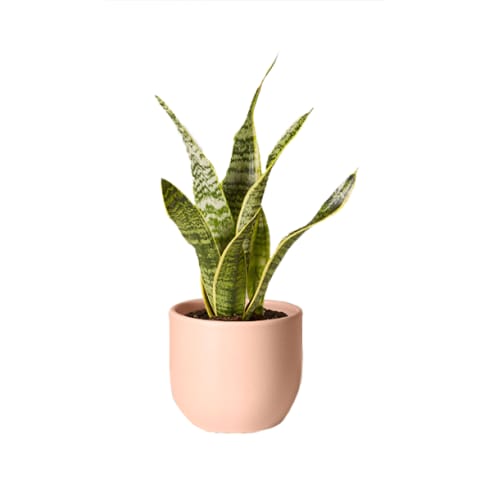
2. Cast Iron Plant (Aspidistra elatior)
Care difficulty from 1 (easiest) to 5 (hardest): 1
Just be sure to: Wait until its soil is completely dry before watering
Price: $$
This hardy plant is perfect for those who live in homes that don't get a ton of natural light. In fact, it's also nicknamed the barroom plant for its ability to survive in dim rooms, Bloomscape's gardening expert Lindsay Pangborn previously explained to mbg. (This is because the Aspidistra elatior grows underneath the shades of trees in the wild!) "It also has a natural resistance to many pests and diseases," Pangborn adds, and, like the snake plant, it can go up to three weeks without water. It prefers things on the drier side, so be sure to wait until its soil dries out completely before giving it a drink, and read up on its other essential care tips here.
Cast Iron Plant, American Plant Exchange ($19)
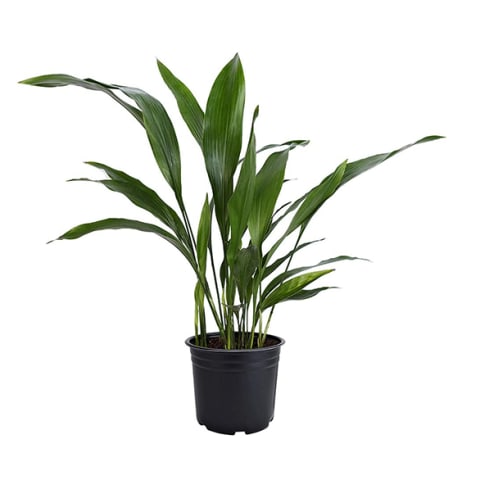
3. Chinese evergreens (Aglaonema)
Care difficulty from 1 (easiest) to 5 (hardest): 2
Just be sure to: Place it out of reach of pets
Price: $
Native to the tropical rain forests of Asia, Chinese evergreens are midsized plants that crave regular waterings (every 1 to 2 weeks, usually) and a bit of bright, indirect sun (they're used to the dappled shade of the forest floor). "When they get enough water, they will put on new growth and look very beautiful for very little maintenance," says Karen Hugg, gardener and author of Leaf Your Troubles Behind. Their leaves can range from light green to hot pink, with a speckled pattern that makes them super unique-looking. Just beware that Chinese evergreens are toxic to cats and dogs according to the ASPCA, so it's best to place yours away from any curious pets. Snag our complete care guide to this plant here.
Aglaonema 'Maria', Rooted ($21)
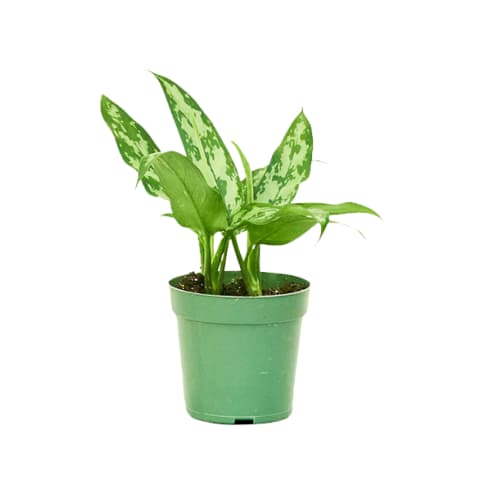
4. African Violet (Saintpaulia)
Care difficulty from 1 (easiest) to 5 (hardest): 3
Just be sure to: Give it room-temperature water
Price: $
Unlike most popular houseplants that stay green year-round, this pick can provide a fun pop of color. "Just like breeding color in a garden, you can actually bring color into your houseplant collection by growing some low-maintenance plants that will bloom every now and then for you," suggests Hugg. African Violets come in a variety of hues, from white to blue to, of course, purple. You can help keep this colorful plant happy by giving it room-temperature, distilled water (not tap!) and only watering its soil, making sure to leave its fuzzy leaves nice and dry to prevent brown spots.
Purple Blossoms African Violet Plant, 1-800 Flowers ($37)
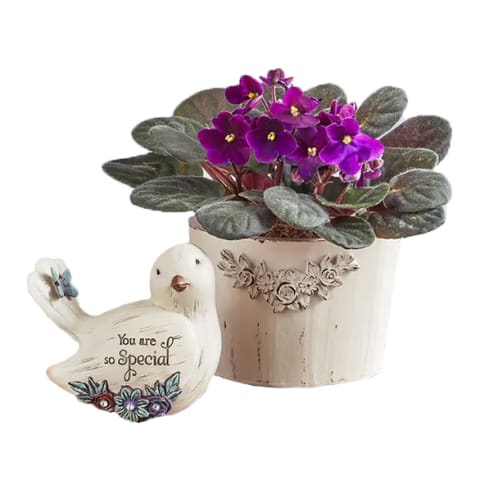
5. ZZ Plant (Zamioculcas zamiifolia)
Care difficulty from 1 (easiest) to 5 (hardest): 1
Just be sure to: Put it in a container that has a drainage hole
Price: $
Ask any green thumb about plants that are nearly impossible to kill, and the ZZ is sure to make the list. These plants may not be the most exciting to look at, but they're so easy to care for that it really doesn't matter. "Hands down, a ZZ plant is my go-to recommendation for all beginners. It just works for everyone– it's super low maintenance, survives in almost every room (even the lowest light), and is aesthetically pleasing in any space," Blocker raves. It's also drought-resistant and can go 2 to 4 weeks without water, making it a great pick for those who travel often. Just be sure to make sure its pot has a drainage hole so any water you give it has a place to escape. Learn more essential care tips (don't worry—it's a short list) here.
ZZ Plant (6 Inch), Outside In ($25)
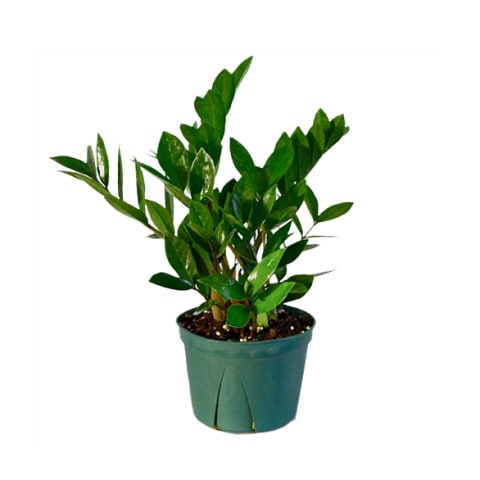
6. Golden Pothos (Epipremnum aureum)
Care difficulty from 1 (easiest) to 5 (hardest): 2
Just be sure to: Check its leaves for bugs
Price: $
"My favorite beginner houseplant is the pothos because you can see it grow in real time," says Doswell. A vining plant that can grow up to 20 feet long indoors, the pothos is also super forgiving and responsive. Even after leaving hers at home unattended for weeks at a time, Doswell notes that it's bounced back, saying, "that kind of forgiveness from a plant is unmatched." Give your golden pothos plenty of light to bring out its yellow hues, and be sure to check it often for signs of pests since its layered leaves are an appealing breeding ground for bugs. Learn more about how to keep it looking great here.
Golden Pothos, Grounded ($25)
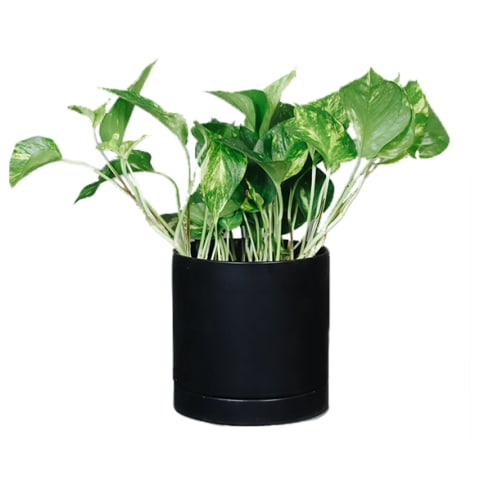
7. Heartleaf philodendron (Philodendron cordatum)
Care difficulty from 1 (easiest) to 5 (hardest): 2
Just be sure to: Give it plenty of humidity
Price: $
This philodendron's signature heart-shaped leaves make it a sweet pick for any beginner collection. "It's one of my favorite plants," Hemsley says, "because it's very similar to the care of a pothos, but to me, it grows a bit faster. Having that gratification of seeing your plant actually grow week by week is super empowering." This trailing plant does best with a bit of humidity, so it would do well near a humidifier or in a bathroom that has a window.
Philodendron Cordatum, Grounded ($18)
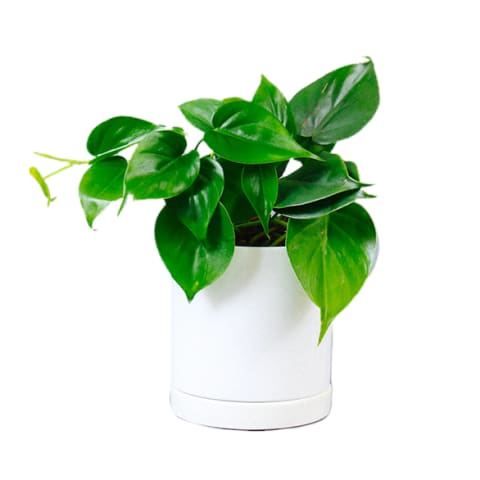
8. Haworthia
Care difficulty from 1 (easiest) to 5 (hardest): 1
Just be sure to: Not give it too much water
Price: $
As a succulent, Haworthias naturally store water to prepare for periods of drought. This means that the houseplant doesn't require frequent waterings and actually prefers to stay on the dry side. The Haworthia family of plants tends to be one of the most forgiving of all succulents, and all they really need to stay lush is a loose soil mix and plenty of sunlight.
Haworthia, Mountain Crest Gardens ($2.50)
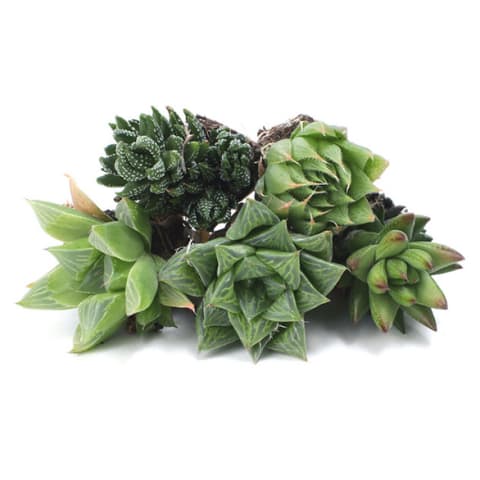
9. Rubber Plant (Ficus elastica)
Care difficulty from 1 (easiest) to 5 (hardest): 2
Just be sure to: Put it in a sunny spot
Price: $$
Rubber plants, also known as Indian rubber trees, can grow to over 50 to 100 feet tall in the wild. Of course, they can't reach quite those heights indoors—but they're still quick to grow as houseplants, especially when placed in a brightly lit area. Aim to place yours near a south- or west-facing window (and if you're not sure which directions your windows face, the Grounded team recommends just using the compass app on your phone!) so it gets plenty of sun. Just beware that the faster it grows, the more often you'll need to upgrade it to a larger planter. Here's a guide on how to do that and more.
Ficus elastica 'Burgundy', The Sill ($78)
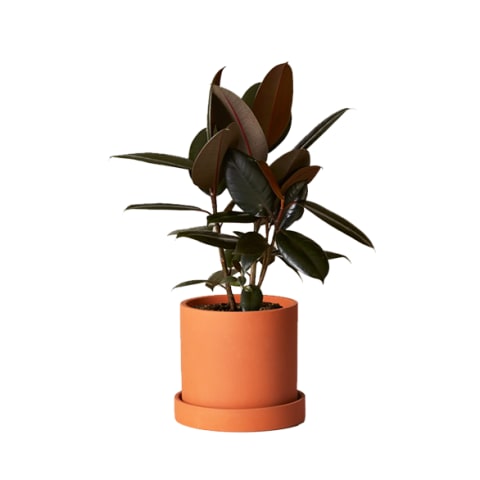
10. Aloe Vera (Aloe barbadensis)
Care difficulty from 1 (easiest) to 5 (hardest): 2
Just be sure to: Look out for droopy, mushy leaves
Price: $
Another succulent variety, the versatile aloe vera is easier to keep at home than you might think. Just put it in a spot that gets plenty of sun throughout the day and water it sparingly (like, once a week max—any more and your aloe might develop droopy, mushy-looking leaves). "Aloe are low-maintenance succulents, and they thrive without much attention," plant expert Nick Cutsumpas previously told mbg. "So, take a deep breath, trust the plant process, and let your plants do their thing." Snag more aloe care tips here.
Aloe Vera, Lowe's ($5)
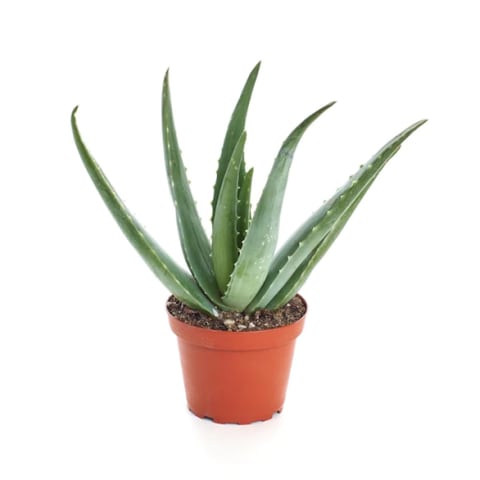
11. String of Hearts (Ceropegia woodii)
Care difficulty from 1 (easiest) to 5 (hardest): 2
Just be sure to: Give it enough sunlight
Price: $$
This dainty houseplant is part succulent and part trailing vine, so it's really the best of both worlds. You get an easy-care plant that looks super pretty dangling from a hanging saucer. Place yours near a window that gets bright sun, water it when the top of its soil feels dry, and you're good to go. "[String of Hearts] really do grow and grow if you don't prune them at all," Laura Jenkins, Ph.D., the founder of House Plant House, previously explained to mbg. Here are some more pro tips for your charming green cascade.
Variegated String of Hearts, Walmart ($20)
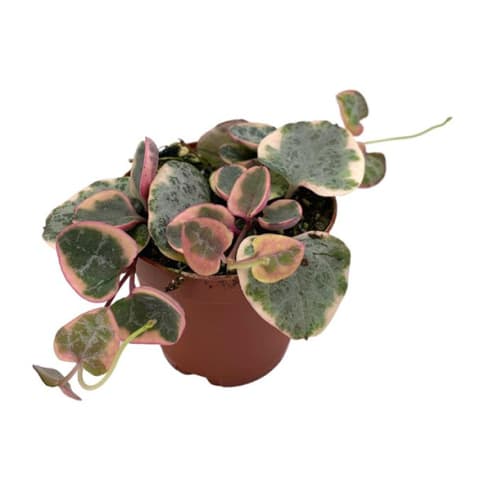
12. Ponytail palm (Beaucarnea recurvata)
Care difficulty from 1 (easiest) to 5 (hardest): 2
Just be sure to: Plant it in a well-draining soil
Price: $$
Don't let the name fool you: This wild-looking plant is not a palm tree at all but a succulent! So it delivers a lush look with very little fuss. As Beatriz Garces of Nature's Way Farms previously explained, "The ponytail palm is a popular houseplant for its drought-tolerant nature and adaptability to almost any environment. It stores water in its unique trunk, which is why it is so easy to maintain." Just be sure to plant it in well-draining soil (a palm or cactus mix would work well) to avoid the dreaded root rot. Read more about ponytail palm care here.
Ponytail Palm, Home Depot ($80)
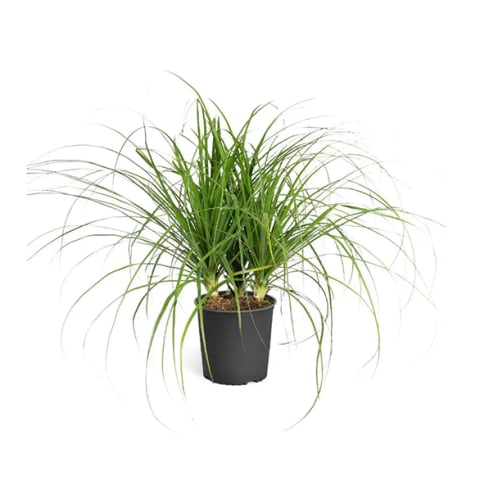
13. Philodendron Green
Care difficulty from 1 (easiest) to 5 (hardest): 2
Just be sure to: Fertilize it if you want a lush look
Price: $
Another fast-growing plant, classic philodendron greens are slightly different from golden pothos—but just as dramatic. "Because of the wide range of habitats that they can be found in, they are fairly easygoing and adaptable to most home environments," Chris Satch, a plant specialist at Horti, let us know. Like most philodendrons, this variety—known for its glossy green leaves—does well placed near a window that gets plenty of light, but not direct sun, all day. Apply a gentle fertilizer once a month during spring and summer to help the trailing plant grow long and strong. Here are some more tips to keep it looking lush.
Philodendron Green in Grant Planter, The Sill ($84)
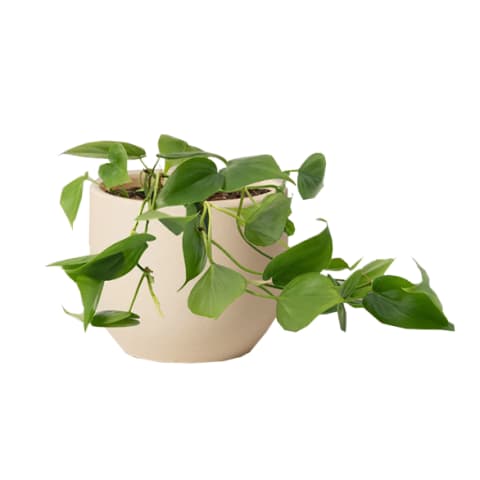
14. Prickly pear (Opuntia)
Care difficulty from 1 (easiest) to 5 (hardest): 1
Just be sure to: Be careful around its prickles
Price: $$
Beginner plant parents can bring an element of the desert into their space with the prickly pear. The Grounded team loves this low-maintenance succulent that can withstand weeks without watering and varied sun (though, of course, they do best in bright light). If you take good care of yours, it will reward you with colorful, funky flowers. Just be sure not to get too close to this desert beauty; its spines feel as prickly as they look!
Prickly Pear Cactus, Dahing Plants ($30)
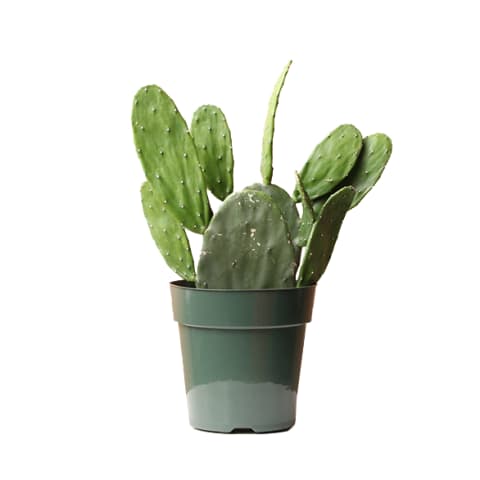
15. Ficus Audrey (Ficus benghalensis)
Care difficulty from 1 (easiest) to 5 (hardest): 3
Just be sure to: Dust its leaves every once in a while
Price: $–$$$
And finally, the Ficus Audrey is a beginner-friendly tree that can grow to make quite a statement. If you don't want to shell out to buy a full-sized Ficus, which can get up to 10 feet tall, you can buy it as a baby and nurse it to health with plenty of sunshine, occasional watering, and generous leaf cleaning. Since its leaves are naturally fuzzy, you'll want to wipe them down with water every few weeks to keep dust from settling and getting in the way of photosynthesis. Besides that, here's what to know about keeping this statement plant happy.
Ficus 'Audrey', Rooted ($19)
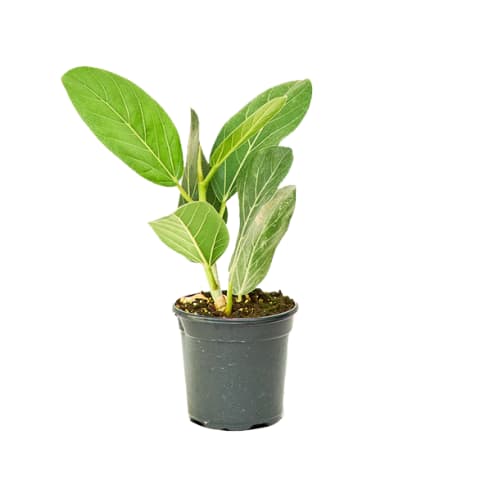
The takeaway.
The truth is that everyone has a green thumb; it's just a matter of finding the right plants to bring it out of you. Check out these low-maintenance options that are fit for beginners and you'll be moving on to more advanced plant care techniques like propagation in no time.
Watch Next
Enjoy some of our favorite clips from classes
Enjoy some of our favorite clips from classes
What Is Meditation?
Mindfulness/Spirituality | Light Watkins
Box Breathing
Mindfulness/Spirituality | Gwen Dittmar
What Breathwork Can Address
Mindfulness/Spirituality | Gwen Dittmar
The 8 Limbs of Yoga - What is Asana?
Yoga | Caley Alyssa
Two Standing Postures to Open Up Tight Hips
Yoga | Caley Alyssa
How Plants Can Optimize Athletic Performance
Nutrition | Rich Roll
What to Eat Before a Workout
Nutrition | Rich Roll
How Ayurveda Helps Us Navigate Modern Life
Nutrition | Sahara Rose
Messages About Love & Relationships
Love & Relationships | Esther Perel
Love Languages
Love & Relationships | Esther Perel

















